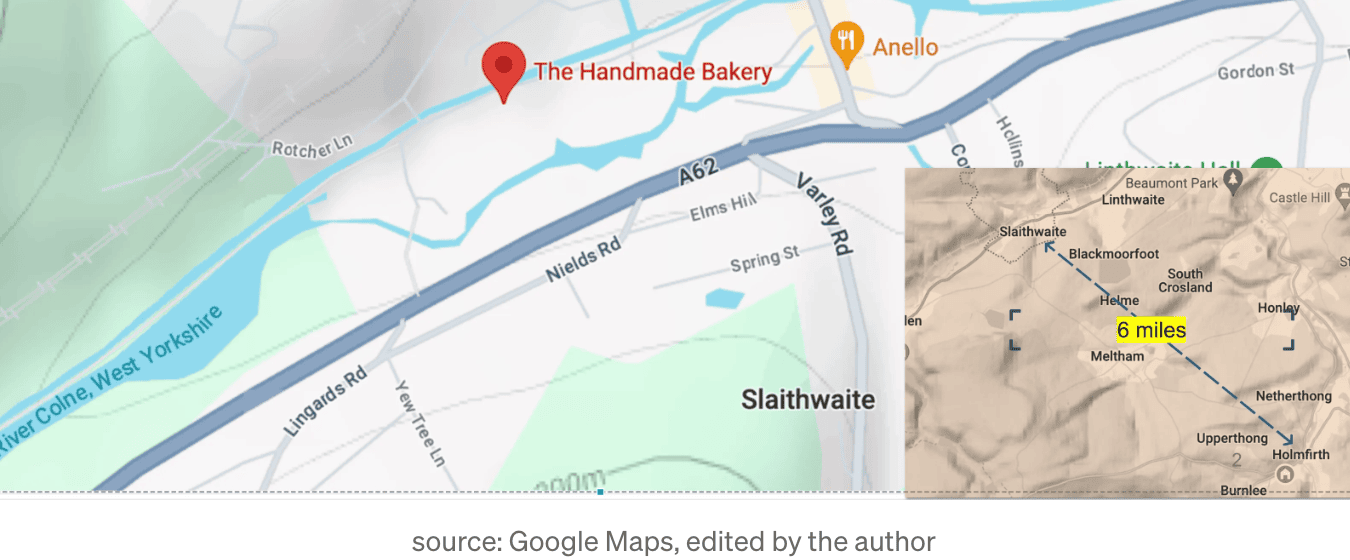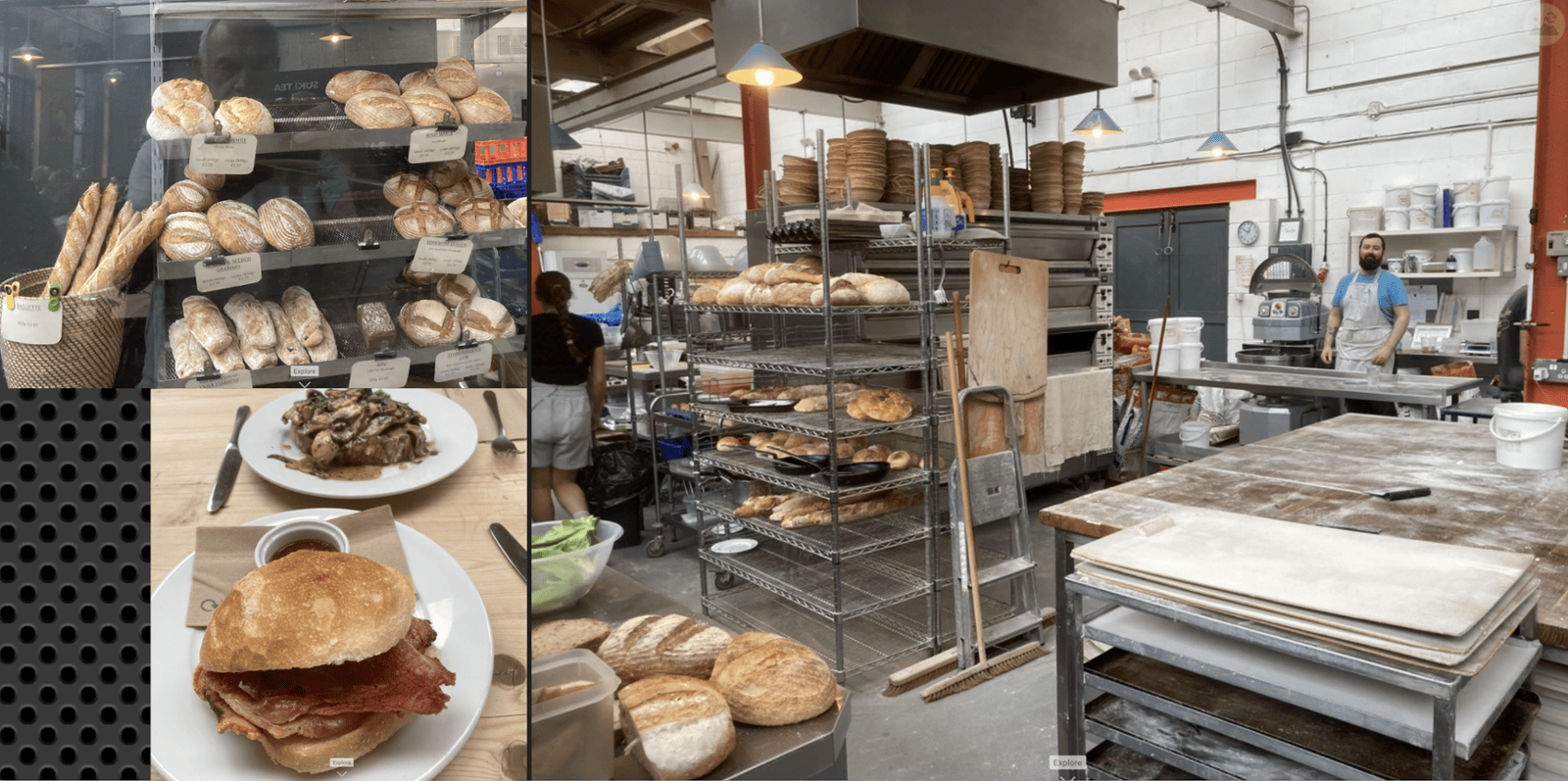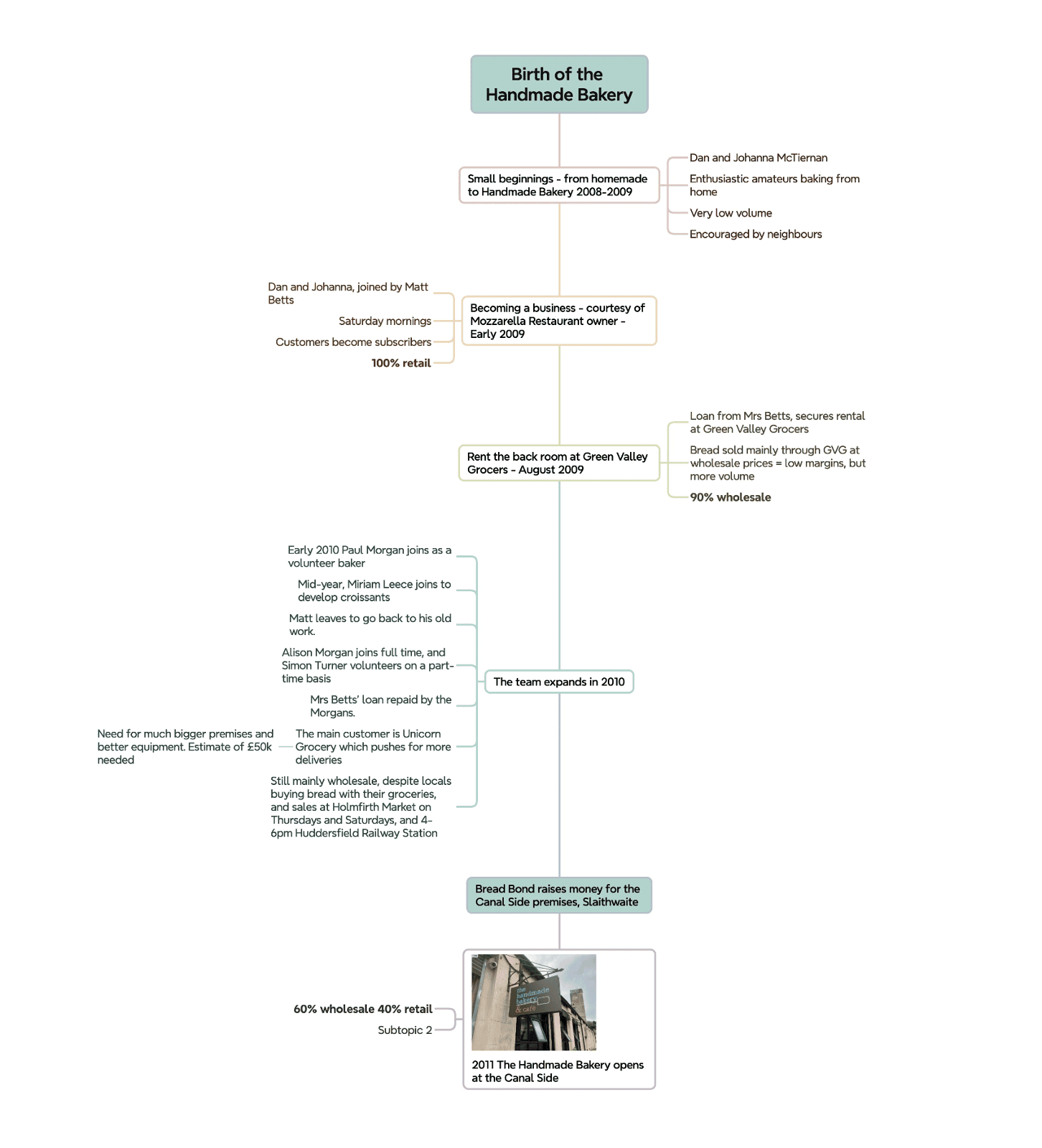A Community-sponsored bakery regenerates life in an old mill town in Yorkshire
A Community-sponsored bakery regenerates life in an old mill town in Yorkshire
The prelude
The prelude
This is the twentieth month of my research journey into regenerative business, and around every metaphorical corner is a new perspective to challenge my thinking. I’d formed the view that a company must be independent of market pressures and external short-term vested interests to have a chance of becoming regenerative. It must have the freedom to exercise its values unencumbered by market forces.
Zoho Corporation got me hooked on regenerative business values and practices. They rightly emphasise their independence as an advantage, giving them control of their destiny and the ability to take the long view. Most competitors, however, are in hock to puppet masters in the guise of VCs, private equity firms, or the stock market. They expect rapid returns and are reluctant to look beyond the next quarter, creating an extractive dynamic.
But then I stumbled across Anglo American, a £40billion+ mining company listed on the London Stock Exchange. Mining is extractive by nature, yet surprisingly Anglo American exhibits regenerative characteristics, exemplified by its North Yorkshire Woodsmith Project. This provided hope that despite the might of external shareholders, the world is not as dualistic as it first appears, a crack of light, a chance for firms from all walks to participate in the planet and humanity-saving regenerative journey. While I had read tons of books spotlighting the dire industrial-age legacy, only a few articulated a regenerative path toward a promised land of eco-balance, revitalised communities and harmonious living.
I was looking for examples of businesses with regenerative values and impacts. I didn’t expect to find one so close to home.
Regenerative inspiration on my doorstep

I love their bread, and behind it is an inspiring story
Every Thursday morning, I head to the local Holmfirth Market to buy a large Wild White sourdough loaf from the small stall sandwiched between a family-owned grocery and a seller of fine cheeses. There are two bakeries in Holmfirth, a small town in West Yorkshire, UK, but neither produces such tasty bread as the Handmade Bakery. You’ll usually find a long queue of locals waiting patiently for a variety of breads, all made with organic flours, some made with yeast and others (my preference) with a sourdough starter. It’s worth the wait.
Curious, I looked at the bakery’s website a few weeks ago. What struck me was the business’s extraordinary genesis and business model — a workers’ cooperative sponsored by the local community through a first-of-its-kind Community Bread Bond.
Discovering more....
That piqued my curiosity, and I wanted to learn more about the Handmade Bakery, so the following Thursday, I asked Jane, the friendly lady who runs the stall at the market, if she could put me in touch with the owners. I wanted to understand the history and possibly include the bakery in my book (yet to be written, let alone published). The founders, a married couple, Dan and Johanna McTiernan, had moved on, although their legacy is flourishing. However, Jane said she would ask one of the bakery’s first co-workers, Alison Morgan, now retired, if she would agree to me meeting her to get more insight into the early years of the bakery. Alison graciously agreed.
A visit to Alison provides further background to the bakery’s birth
A visit to Alison provides further background to the bakery’s birth
I had a very fruitful visit to Alison’s home, a lovely farmhouse at the end of a long, stony track. I was invited into the kitchen, where I met her husband, Paul. I spotted a Shipton Mill flour sack in the corner, and Paul told me he bakes their own bread. After a warming cup of coffee from Paul, Alison told me how the bakery had started.
A local regenerative climate helped Dan and Johanna turn their idealism into reality
Dan and Johanna were directly inspired by the example of Unicorn Grocery in Chorlton-cum-Hardy, Manchester. Established in 1996, Unicorn Grocery was set up as a workers’ cooperative. The cooperative business model has a rich history in the North West of England, with the first food store established in 1844 in Rochdale by working-class men fed up with the high prices and low quality of essential foods. High quality and fair prices are core values of the cooperative movement, not the extractive pursuit of profit for shareholders.
Another source of inspiration was the Community Supported Agriculture network, which is also based on the workers’ cooperative model. Closer to their ambition, inspiration came from the Real Bread Campaign, run by the charity Sustain, led by Andrew Whitely, a long-time organic baker.
Perhaps more indirectly, there was a background of regenerative influence from the Marsden and Slaithwaite Transition Towns (MASTT) established in 2007, which inspired various local community-based projects to take action to boost sustainability and improve the quality of life. MASTT is a hub of a larger, now global movement, the Transition Network, co-founded by Rob Hopkins, a local community sustainability and resilience pioneer. MASTT was already involved with several community-supported projects in Slaithwaite. These movements and activities inspired the local community and provided fertile ground for the emergence of the Handmade Bakery.
Seeking fulfilment and purpose beyond philosophy
Seeking fulfilment and purpose beyond philosophy
Before the bakery started, Dan was a communications officer for the Permaculture Association, a charitable movement aiming to:
''Create a community of change-makers who use permaculture ideas, design and practical solutions to build a harmonious and flourishing future.''
While a worthwhile role, the daily three-hour commute proved too taxing. He calculated that if he and Johanna could grow their own vegetables and bake bread, they could get by without wasting hours travelling each day. Their first son, Otso, had only recently been born.
Having a new baby would probably make most people stick to their day jobs. Dan had other ideas, however. He felt that being closer to home would give Johanna more direct support in bringing up their new child. A shift in his consciousness gave him the impetus to turn his newfound bread-baking passion into a full-time job. After I met with Alison and Paul, I discovered a Substack article, Heeding the Call, in which Dan explained his feelings:
''What had previously been an unconscious push against the dominant culture and a pull towards something more meaningful and more alive started to blossom into my waking consciousness.''
This was more compelling than a formal business plan and would be more fulfilling than his vicarious role at the Permaculture Association.
Dan and Johanna McTiernan had no experience running a bakery, let alone starting one. While Johanna had home-baked most of her life and had a fifty-year-old sourdough starter from her family in Finland, Dan had only a one-day baking course under his belt — hardly a good omen.
2009 — An inauspicious start, but local subscribers come to the rescue
2009 — An inauspicious start, but local subscribers come to the rescue
Given their experience level, a bank loan was not an option. Nor did they have significant savings or family in the area. They’d only recently moved to Marsden, Slaithwaite’s neighbouring village, so they barely knew anyone. After sharing surplus bread made at home with neighbours, word soon spread that it was tasty with a delicious crust, unlike the mass-produced lifeless bread from most supermarkets.
In 2009, the Handmade Bakery was born. Blessed by the generosity of the owner of the local Italian restaurant, Mozzarella, they rented his pizza oven on Saturday mornings to bake more bread. As bread sales climbed, Dan and Johanna, now supported by Matt Betts, an art teacher on a sabbatical, produced a low volume of bread for locals. To fund ingredients, bread was sold on a subscription basis, but to expand, they needed to find somewhere with more space that would allow them to increase volumes.
The Green Valley Grocer (GVG), also a cooperative, had a back room to let, and a social enterprise loan from Matt’s partner’s business covered the rent for a year and paid for essential baking equipment. Bread was also sold through the Green Valley Grocer (GVG). While demand grew, the Handmade Bakery had to sell its bread wholesale to GVG.
2010 — the workers’ cooperative takes shape
In early 2010, Paul Morgan joined the bakery as a volunteer to increase production. Miriam Leece came on board mid-year to add croissants to the range. Matt returned to his former job, and Paul’s wife Alison joined full-time. Simon Turner, a cellist at the renowned Hallé Orchestra, provided part-time support.
Sales increased, driven significantly by The Unicorn Grocery. Wholesale accounted for around 90% of revenue. To offset this low-margin business, new retail customers were served twice a week at Holmfirth Market, and Alison set up a stall outside Huddersfield Railway Station between 4–6 p.m., which proved successful as passengers bought bread and patisseries on their way home.
As Paul told me on my second visit, the social enterprise loan was repaid to Matt’s partner’s company and taken over by the Morgans.
By yearend, HMB received acclaim beyond Slaithwaite. The bakery was a runner-up in the BBC’s Best Retail Initiative category in the Food and Farming Awards.
2011 — the Handmade Bakery and Café becomes firmly established through community support and the Bread Bond
2011 — the Handmade Bakery and Café becomes firmly established through community support and the Bread Bond
As volumes rose, it soon became apparent that HMB needed larger premises. Unicorn Grocery kept pushing for more frequent deliveries to keep up with the growing customer demand. Alison found a dilapidated old weaver’s shed beside the canal towpath, which proved to be an inspired choice. They struck on the idea of the Community Bread Bond, a loan that would be paid back within two to five years, with interest equivalent to 6.25%, paid for in a steady supply of loaves. (This idea of a local community bread bond sparked my desire to learn more about this innovative bakery). Over sixty families subscribed to the bread bond. This spoke volumes about the community’s trust and goodwill for HMB and its co-workers, and the quality of the bread.
The bread bonds provided £50,000 of capital, enough to buy the premises, an electric five-deck bread oven, and a dough mixer. To minimise costs, they renovated and decorated the shed themselves.
Dan acknowledges the critical roles played by Alison and Paul
“Paul and Alison Morgan were crucial to the success of the HMB project. Paul arrived at first to offer his services as a volunteer baker and quickly became so much more. His organisational and logistical skills (gained as a former plant manager in the automotive industry) and his keen eye for detail helped us turn the idea from an idealist start-up into a business. Alison soon joined the team, and she brought a passion for alternative food systems and an incredible work ethic that made the team much stronger again. Without their initial financial loan to enable us to renovate the bakery space in Green Valley Grocer and buy essential equipment, the bakery would not now exist. They were some of our very first community supporters, and HMB should be very grateful to them.”
Within two years, nine people were employed part-time. Today, over 20 are employed in the bakery and café. By the end of 2011, a healthier balance of 60% wholesale/40% retail was achieved.
Breakfast at the Hand Made Bakery proves a big hit with my wife
Breakfast at the Hand Made Bakery proves a big hit with my wife

Recently, I took my wife, Debs, to the Handmade Bakery for a Saturday morning breakfast. Neither of us had been before. She had mushrooms on toast, and I had a delicious bacon butty in a crusty roll covered in homemade brown sauce with a hint of coriander seed (see inset). I was kindly permitted to take some photos of the bakery. I also had one of the best cups of coffee ever, produced by Darkwoods Coffee, nearby. It turns out that Darkwoods is a certified B Corp company. That’ll be my next writing project and the Green Valley Grocer. It seems that Slaithwaite is a magnet for community-supported businesses today. Although Slaithwaite is only six miles away, I hadn’t been there for over a decade. We’ll be back often now. Thanks to The Handmade Bakery and other pioneers sharing the regenerative philosophy, it’s an invigorated community. Yesterday, my wife and I enjoyed another short stay at the café after a two-mile walk along the busy towpath. What a difference the Handmade Bakery has made to Slaithwaite and its community.
The power of community in revitalising the local economy and quality of life
The power of community in revitalising the local economy and quality of life
At the start of this article, I mused about business models and whether ownership was the key ingredient for regenerative success. Despite Anglo American’s regenerative leanings, I still err on that side. Both Zoho and Anglo American operate at the macro-scale. However, the Handmade Bakery illustrates what can be achieved at the micro-scale when a community unites and is interconnected with local businesses. Imagine what could be achieved if this can be replicated in every town and village, bringing together ecosystems of regional suppliers, shops, workers, and communities with the guidance and support of visionary movements like the Transition Network. Just imagine.
Appendix

For more on the Transition Network take a look at this video clip: https://www.youtube.com/watch?v=FFQFBmq7X84
